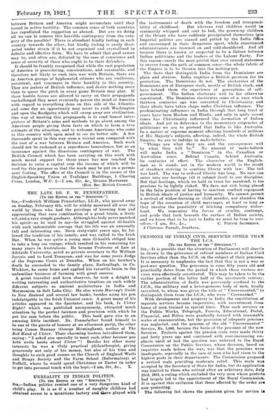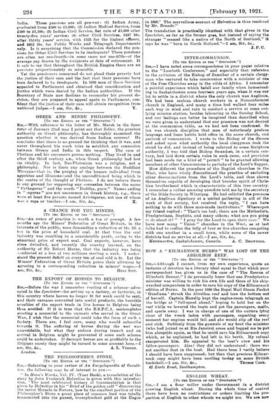PENSIONS OF INDIAN CIVIL SERVICES OTHER THAN THE I.C.S.
(To THE EDITOR or THE " SPECTATOR.") SIR.—It is possible that the attention of Parliament will shortly be drawn to the grievance of retired members of Indian Civil Services other than the I.C.S. on the subject of their pensions. It is necessary to emphasize the fact that this is not a war or post-war question. The grievance is some fifty years old and practically dates from the period in which these various ser- vices were effectively constituted. This may be taken to be the earlier portion of the latter half of the nineteenth century. The administration of India was previously confined to the I.C.S., the military and a heterogeneous body of men, locally recruited, to whom was given the title of " Uncovenanted," to distinguish them from the I.C.S., who were "Covenanted."
With development and progress in India the constitution of separate services became imperative, with recruitment from home of men trained in special lines. Thus such services as the Publics Works, Telegraph, Forests, Educational, Postal, Financial, and Police were gradually formed with reasonable scales of remuneration, but the provision of adequate pensions was negledted, and the pension of the old " Uncovenanted " Service, Rs. 5,000, became the basis of the pensions of the new Services. Protests against the pension scale were made thirty and forty years ago and continued with ever-increasing em- phasis until at last the question was referred to the Royal Commission on the Public Services, whose decision, based on inquiries made before the war, was that the pensions were inadequate, especially in the case of men who had risen to the highest posts in their departments. The Commission proposed a revised scale providing moderate relief. This scale was accepted by the Secretary of State for India, but its application was limited to those who retired after an arbitrary date, July 23rd, 1913, a ruling which excluded the very men whose protests had largely led to the appointment of the Royal Commission. It is against this exclusion that those affected by the order are now protesting.
The following list shows the pensions given for service in
India. These pensions are all pre-war : (1) Indian Army. graduated from £500 to £1,000; (2) Indian Medical Service, from £500 to £1,100; (3) Indian Civil Service, flat rate of £1,000 after twenty-five years' service; (4) other Civil Services, £437 10s. after thirty years' service, with £525 for the highest officers, and £612 10s. for Public Works and Telegraph Departments only. Is it surprising that the Commission declared the pen- alone for Other Civil Services to be inadequate? These pensions are often not one-fourth—in some cases not one-fifth—of the average pay drawn by the recipients at date of retirement. It is safe to say that throughout the British Empire there are no pensions proportionately so miserable.
Yet the pensioners concerned do not plead their poverty but the justice of their case and tjie fact that their pensions have been declared to be inadequate. In 1890 men of these Services appealed to Parliament and obtained that consideration and justice which were denied by the Indian authorities. If the Secretary of State now declines to reconsider his present de- cision, they are prepared to appeal again to Parliament, con- fident that the justice of their case will obtain recognition from unbiased judges.—I am, Sir, &o., Y.



































 Previous page
Previous page